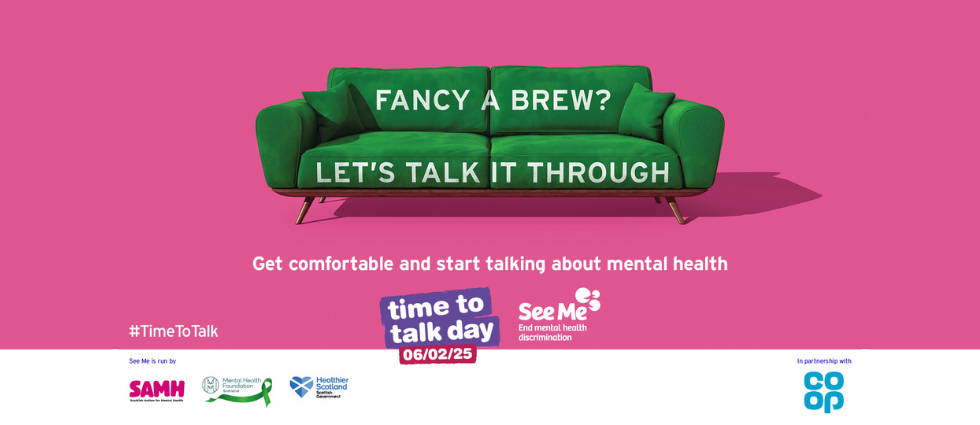
Time to Talk Day 2025
Time to Talk Day 2025 will take place on Thursday 6 February. Get everything you need here to get involved.
Time to Talk Day is the nation’s biggest mental health conversation. Taking place on Thursday 6 February 2025, it is a day that friends, families, communities, and workplaces come together to talk, listen and change lives.
For Time to Talk Day, we’re encouraging the people of Scotland to take the time to have a conversation about how they're feeling, to help combat the stigma that still exists around mental health.
The theme for this year’s campaign is "get comfortable and start talking about mental health". Talking openly and honestly can be the first step towards better mental health for everyone. It can reduce stigma and help people feel comfortable enough to seek help when they need it.
About Time to Talk Day
Time to Talk Day is run in Scotland by See Me, with SAMH (Scottish Action for Mental Health), by Mind and Rethink Mental Illness in England, by Inspire in Northern Ireland, and by Time to Change Wales in Wales, all in partnership with the Co-op.
We aim to support communities up and down the country to have more mental health conversations than ever before.
Talking about mental health reduces stigma helping to create supportive communities where we can talk openly about mental health and feel empowered to seek help when we need it.
Join us and get talking about mental health for Time to Talk Day.
Talking about mental health
Not everyone feels comfortable talking about how they're feeling. But talking openly and honestly can be the first step towards better mental health.
There are lots of ways you could start a conversation. You could have a chat alongside an activity, share a cuppa with a loved one or text a mate – and Time to Talk Day offers a great platform to get that conversation started.
While there’s no right or wrong way to talk about mental health, our talking tips can help you have those all-important conversations. Get comfortable and start talking about mental health.
Supporting someone else
1. Ask questions and listen
Asking questions can give the person space to express how they’re feeling and what they’re going through. Try to ask questions that are open and non-judgmental, like: “What does that feel like?”
2. Use positive body language and encourage them
Small verbal comments like ‘I see’ or ‘what happened next?’ will let them know you are paying attention to them and actively listening.
3. Don't try and fix it
Try to resist the urge to offer quick fixes to what someone is going through. Just talking can be really powerful, so unless they’ve asked for advice directly, it might be best just to listen.
4. Dispel any myths and avoid clichés
Mental health problems are more common than people think and can affect anyone at any time. Comments like, “Pull yourself together,” or, “You’re just having a bad day,” are not helpful. Think before you speak.
5. Be patient
No matter how hard you try, some people might not be ready to talk about what they’re going through. That’s okay – the fact that you’ve tried to talk to them about it may make it easier for them to open up another time.
Sharing your own feelings
1. Find a way that feels right for you
Think about how you want to talk about your mental health. This could be a face-to-face conversation, or you might find it easier to talk on the phone or even write down how you feel.
2. Find a suitable time and place
Sometimes it’s easier to talk side-by-side, rather than face-to-face. You might want to chat while you are doing something else, like walking or cooking. However, don’t let the search for the perfect place put you off.
3. Practice what you want to say
You could do this in your head or make some notes. Phrases like, “I’ve not been feeling like myself lately,” might provide a starting point.
4. Be honest and open
It can sometimes feel uncomfortable sharing something so personal, but explaining how your feelings are affecting your life may help others to understand.
5. Suggest things they could do to help
This might just be listening and offering emotional support or there may be practical help you need.
Getting help
If you’re struggling yourself, or you’re looking to find out more about supporting someone close to you, help us available.

Get more inspiration...
Discover more tools and resources to help you take action against mental health stigma wherever you are.
See Us Movement